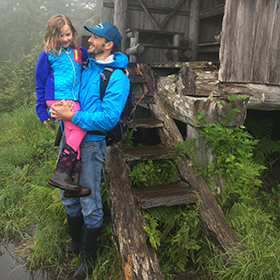About 860 people live in Klawock, a town on Prince of Wales Island, Alaska. There’s a ferry to Ketchikan, and a runway. Fish are abundant. And in a few years, the town will have another important resource: Stephen Ellison, M.D.
Ellison is now a second-year medical student at the UW School of Medicine through the Alaska WWAMI program. He grew up in Klawock and plans to return home to practice medicine when he finishes his training.
“It was my big goal from day one to get into UW,” says Ellison. “When your goal is to serve your people, you want the best training you can get.”
Our WWAMI students
Ellison is attending school at the University of Alaska Anchorage (UAA), a partner university in a 45-year-old UW School of Medicine program called WWAMI. The WWAMI acronym represents the five participating states in the program: Washington, Wyoming, Alaska, Montana and Idaho. Partner universities include Gonzaga University, the University of Wyoming, Montana State University and the University of Idaho, as well as UAA.
Buoyed by the support of state legislatures, WWAMI’s partner universities and a network of hospitals, clinics, doctors and faculty work together to educate medical students. Ellison, like other students, is spending the first 18 months of his training in his home state.
School leaders take pride in their students, many of whom feel a connection to the Northwest — and are likely to stay in the region to practice. Ellison is just this kind of student.
“As an Alaska Native man,” he says. “I feel it is my responsibility to serve my people.”
Part of the community
Klawock is home to many Alaska Native people; in fact, the Alicia Roberts Medical Center is named after a Tlingit elder. But when Ellison was a child, the center didn’t exist. If you had a broken arm, you left the island for care.
“It’s a lot better than it used to be,” says Ellison. “But the challenge is getting medical staff to commit for a significant period of time, to become part of the community.”
Ellison is definitely a part of Klawock. He left for college, but came back to fish during the summer. And this last summer, he returned again to participate in the four-week, UW School of Medicine-sponsored Rural/Underserved Opportunities Program (R/UOP). It’s an immersive medical experience, and Ellison got a lot of practice reading X-rays, stitching and splinting at the medical center. He also participated in the nerve-wracking experience of getting trauma cases flown to the mainland.
“At times, it was intimidating,” Ellison says. “Your resources are very limited, and you have all this responsibility. It took a week or two for it to feel doable.”
Accelerate education
The stress Ellison experienced during R/UOP is familiar to medical students. There’s so much to learn; they’re taking care of patients; they care about getting things right. But finances are also a stressor. A medical education is expensive — even the UW’s cost-effective program. “Right now, things are tight — medical school is tough,” admits Ellison.
UW Medicine and the University of Washington are committed to helping students like Ellison reach their potential, and part of that commitment is financial: working with donors to provide students with scholarships. Ellison, who receives a UW School of Medicine Scholarship, is very grateful.
“That scholarship was another reason to choose UW,” he says. “It’s made things a lot easier to manage.”
The kid factor
Ellison had another inspiration when choosing the UW School of Medicine: he had become friends with Taylor Dunn, M.D. ’99, who delivered his baby daughter, Bella, in 2009. Dunn told Ellison about the WWAMI program and invited him to shadow him in clinic.
“After the first week or two,” says Ellison, “I knew that medicine was what I wanted to do.”
Bella, who helped start her father on the path to medical school, is a little ambivalent about it. “She gets to see the hard work and the crazy hours,” Ellison says. “But half the time, she tells me she wants to be a doctor when she grows up.”
For Ellison, there’s no ambivalence at all. Being part of his community? Serving his people?
“It’s one of the best things I could do,” he says.

